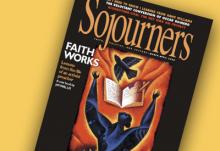Definitional books come around about once a decade.
Poverty
Let the good times roll! President Bill Clinton was absolutely beaming as he reported the U.S. Census Bureau's annual poverty statistics.
You’d have to go back a long way to find this much church unity—maybe not to the first Pentecost, but a long way, to be sure. Churches in this country, it seems, have been known more for what has divided them than for what brings them together.
But there’s evidence that’s changing. Christian leaders representing 60 Catholic, evangelical, mainline Protestant, and African-American churches—along with major church-based organizations—gathered on the East steps of the U.S. Capitol in February around a commitment and promise: ending poverty in America.
With the launch of Call to Renewal’s Covenant and Campaign to Overcome Poverty, American church leaders are saying that poverty is no longer a bipartisan political tool but a top-priority nonpartisan issue. "The story today is very simple," observed Sojourners editor Jim Wallis, convener of Call to Renewal. "In a time of record prosperity, the poor are being left behind, but the churches are being drawn together. Today we are launching a Covenant that can change our lives and a Campaign that can change this country."
The Covenant begins with a confession: "The persistence of widespread poverty in our midst is morally unacceptable. Just as some of our religious forebears decided to no longer accept slavery or segregation, we decide to no longer accept poverty and its disproportionate impact on people of color."
Joining Wallis on the Capitol steps were John Carr, representing the U.S. Catholic Conference; Rich Cizik, of the National Association of Evangelicals; syndicated columnist Arianna Huffington; Rev. Wallace Charles Smith, representing the Progressive National Baptist Convention; Rev. Bob Edgar, general secretary of the National Council of Churches; Sharon Daly, representing Catholic Charities USA; Mark Publow, of World Vision; and David Beckmann, president of Bread for the World.
Seattle now has nine billionaires and 10,000 millionaires, according to a National Public Radio report a few weeks ago. A recent U.S. News cover story proclaimed, "The Rich Are Getting Richer." Housing prices in economic boom towns like San Francisco leave us in stunned disbelief, as do amazing news reports of investors who gain or lose $6 billion in one week’s stock market trading. Even the overused phrase "record breaking economy" seems old hat now when there are new milestones reached and records broken almost every day.
Clearly the "permanent boom" has done a lot of individual good for many people. But what will it mean for the common good? The same NPR report told of the ever-widening gap between rich and poor and the crumbling of public institutions such as schools. The rates of evictions and homelessness in San Francisco are also skyrocketing, and a very troubling moral picture is emerging. In the same news program, we hear that NASDAQ has reached an all-time high, then learn that new studies show alarming child-poverty rates. We learn that the number of U.S. millionaires has quadrupled from 2 million to 8 million in the last 10 years, but that 1.3 million people will become homeless sometime this year and 30 million people will experience "food scarcity," otherwise known as hunger. A recent New York Times Sunday Magazine cover story speaks of "The Invisible Poor," while a front page piece the same week in the Times explores the consequences of a new syndrome called "affluenza" on the children of the rich.
These gaping moral contradictions and growing spiritual concerns are beginning to awaken the churches, in particular, to their responsibilities and, indeed, to their prophetic vocation. For the first time in more than 100 years, churches from across the political spectrum are coming together on a social issue—poverty. The growing unity includes black churches, Catholics, mainline Protestants, and even conservative evangelicals who recently have been more known for their involvement in other social issues.


